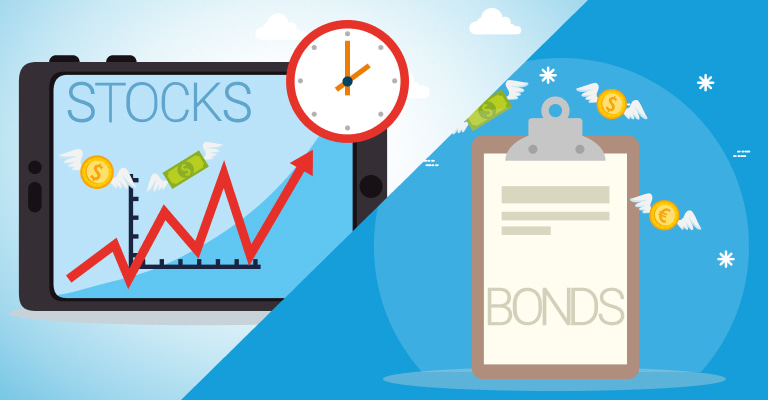The stock market is the market where stock securities are traded. Investors buy securities to make a profit on them. The easiest way to conclude transactions for the purchase and sale of stocks is on a specially organised trading platform – the stock exchange. It makes it possible to buy securities reliably and quickly and sell them at a fair, that is, market price.
What are stocks? A stock is a share of a company. If a company has 10,000 stocks and you buy 100 stocks, you own 1% of that company, which gives you certain benefits and a part of the company’s profit.
The main participants in the stock market are:
- Investors are those who are ready to invest money and buy securities. In the stock market, you can find both non-professional and professional investors. Investors cannot enter the market directly;
- Companies – or issuers of securities. They place their shares or bills on the primary market, then through the intermediaries, they enter the stock market, where investors buy them. Issuers also pay interest to shareholders and decide to increase the number of shares;
- Brokers are the very intermediaries that connect the stock market, investors, and business. Without them, the investor cannot buy shares, and the company cannot place them. Therefore, brokerage organisations are an integral part of the stock market;
- Regulators – establish the rules of trade, the rights, and obligations of intermediaries, the procedure for entering the market, issuing shares, etc. Different jurisdictions may have one or several regulators responsible for their lines of business.
How the stock market works
The stock market is the market for selling and buying securities: stocks, bonds, shares of exchange-traded funds. To avoid fraud and unfair play, the exchange develops rules for trading securities and guarantees the execution of transactions.
The stock trading platform organises trading in securities and controls trading participants. All transactions on the exchange are registered. Legal entities on the stock exchange attract money for development and production, while individuals turn savings into investments and receive additional income.
Why and how securities are issued? Companies issue stocks or bonds because they need money for production and development.
If an investor buys shares, he becomes the owner of a piece of the company’s business: he can participate in a shareholders meeting and receive dividends. If an investor buys bonds, he lends money to the company at interest for a certain period, for example, for several years. For a company, bonds are analogous to a bank loan, often at a lower interest rate.
How to Choose Stocks
The best option is to consult with a financial advisor and get the opinion of analysts, but you should always remember to conduct your own analysis. The choice of stocks depends on the stock market situation, financial goals, and even the personal qualities of the investor. It makes sense to consult with a professional to align market opportunities with your personal goals effectively.
Today, the stock market uses the following basic strategies that allow you to profit from the purchase and sale of securities even with a small start-up capital:
- Conclusion of trades, taking into account the P/E ratio (price-to-earnings), is a ratio for valuing a company that measures the current stock price in relation to earnings per share. In this case, P is the price of one share, and E is the company’s earnings per share, which is reported in the consolidated annual report. A small value of the coefficient (below 5) indicates that these shares are undervalued.
- Determination of the general market trend using the swing trading strategy. The essence of such operations is to calculate the general tendency of market transactions to rise or fall with the prompt conclusion of transactions on short positions.
- Using contracts for the difference in price. The easiest way to get started with little or no preparation.
- Positive changes in the industry in which the company operates. For example, an increase in demand, relaxation in tax legislation, benefits from the state, a cyclical rise in raw materials prices after the fall, etc.
However, you should understand that any transaction on the stock market carries certain risks. Detailed market analysis and practice on the right trading platform will help minimise these risks.
How to Choose Bonds
Bonds are actually IOUs. They are issued by a company (or a state, it can also be an issuer), which needs money. Its buyer automatically becomes a creditor, and the seller who issued the bond becomes a debtor (issuer). The debtor pays an additional amount on top of the borrowed one for using other people’s money.
How does a bond differ from a stock? The ability to immediately know when and how much profit the investment will bring. The interest rate, size, and period of payments are negotiated in advance.
For example: you bought 10 bonds with a par value of $1,000 each at a rate of 15% per annum for 10 years. This means that you will earn $1.5 thousand annually (1000 * 10 + 15%). And in 10 years, you will get your $10 thousand back.
If the stock is a fund, then the bond is debt. In the first case, the investor becomes a co-owner or sole owner of the firm. In the second – the creditor of this firm.
Bond prices fluctuate much less than stock prices. Besides, the bond has a certain period of life, after which it is necessarily redeemed by the company that issued it. The company buys the bond at par to return the investment regardless of market price fluctuations. Bonds are less risky than stocks. But the potential income from them, as a rule, is lower.
When choosing a bond on the bond market, three parameters are key:
- The issuer is the company that issued the bond. The more reliable the issuer, the better. If the company goes bankrupt, then the investor may lose the invested funds. But there is also a rule, the lower the risks on bonds, the lower the yield.
- Yield is the percentage income that an investor will receive while holding a bond, buying it at market price, and redeeming it at par. There are different calculation formulas, but the most valuable comparison is the effective yield to maturity.
- Duration is a parameter similar to maturity. The higher the duration, the more the market price of the security can fluctuate. It is recommended to select a duration close to the investment period. As a rule, the higher the duration, the higher the yield.
What to Choose – Stocks or Bonds?
Of course, it is difficult to decide on such a solution, so we have prepared a small comparison table:
| Buy shares if: | Buy bonds if: |
| You want to invest money for the long term. | You may need the invested money at any time. |
| You feel comfortable when the potential return on investment is high but associated with uncertainty. | You want to limit the risks as much as possible. |
| You are satisfied with small but predictable and understandable profitability. |
Bonds belong to the category of conservative stock market instruments, the risk of loss on which is small, and the yield is only slightly ahead of the interest on a bank deposit. Bonds are not suitable for active speculation, but for investment purposes, they can be very useful.
The investor does not have to be limited to only stocks or only bonds. He can add both asset classes in different proportions to his portfolio.
You need to open a brokerage account, deposit funds into it, and install a mobile application on your phone or a trading terminal on your computer to start investing. With its help, you can buy and sell stocks and bonds. You will also be able to buy dollars and euros at the exchange rate, which is usually better than the banks’ exchange rate.
Read more about him by visiting his LinkedIn profile or contact us directly to learn more about the team.Our Author:





COMMENTS